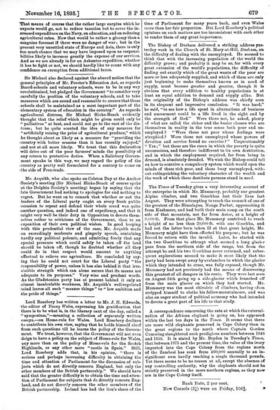The Bishop of Durham delivered a striking address yes- terday
week in the Church of St. Mary-at-Hill, Durham, on the difficulty of dealing with the unemployed. He seemed to think that with the increasing population of the world the difficulty grows; and probably it may be so, for with every great extension of the world's populations, the difficulty of finding out exactly which of the great wants of the poor are more or less adequately supplied, and which of them are only just beginning to make themselves known as in need of supply, must become greater and greater, though it is obvious that every addition to healthy populations is at least an equal addition to demand and supply alike. But the originality of the Bishop's address was chiefly seen in its eloquent and impressive conclusion. "It was hard," he said, "to see how a life spent in alternations of business and amusement could be a life lived in the sight and by the strength of God." Were there not, he asked, plenty of what are called the richer and the busier classes who are themselves in reality in the true sense both poor and un- employed P "Were those not poor whose feelings were atrophied ? Were those not unemployed whose powers of devotion and service found no exercise ?" Unquestionably " Yes ;" but these are the cases in which the poverty is quite unconscious, and therefore indifferent to its own destitution, and in which the employment required, far from being in demand, is absolutely dreaded. We wish the Bishop could tell us how to contrive a compulsory system which would open the minds of these rich poor, and these busy unemployed, with- out extinguishing the voluntary character of the wealth and the work of which these destitute persons stand in need.


















































 Previous page
Previous page